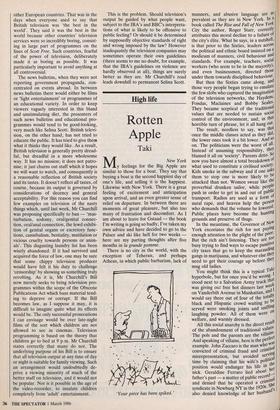Television
Wally's warning
Alexander Chancellor
My esteemed colleague Nina Mys- kow, the television critic of the News of the World, has named Selina Scott her 'Wally of the Week'. So, in effect, though he wouldn't put it that way, has my esteemed colleague Julian Barnes, the television critic of the Observer. Ready as I am to follow any trend, I hereby name Miss Scott my 'Wally of the Week' as well. I don't know what a 'Wally' is, but I take it to be derogatory in an amiable kind of way. I certainly hope it is amiable. If it isn't, I withdraw the epithet immediately. For I have nothing against Miss Scott. I merely see her as a sort of warning of what British television will be like if Mr Winston Chur- chill has his way. No violence, no sex, nothing nasty at all. Just Miss Scott visiting dreary little Scottish islands where the inhabitants gather mournfully together in the evenings to dance reels. It reminds one of what television once used to be like in other European countries. That was in the days when everyone used to say that British television was 'the best in the world'. They said it was the best in the world because other countries' television services were so incredibly boring, consist- ing in large part of programmes on the lines of Scott Free. Such countries, fearful of the power of television, deliberately made it as boring as possible. It was particularly important to avoid anything at all controversial.
The news bulletins, when they were not reporting government propaganda, con- centrated on events abroad. In between news bulletins there would either be films or 'light entertainment' or programmes of an educational variety. In order to keep viewers vaguely interested in this bland and unstimulating diet, the presenters of such news bulletins and educational pro- grammes would tend to be good-looking, very much like Selina Scott. British televi- sion, on the other hand, has not tried to educate the public. It has tried to give them what it thinks they would like. As a result, British television is generally pretty dread- ful, but dreadful in a more wholesome way. It has no mission; it does not patro- nise; it just churns out stuff which it hopes we will want to watch, and consequently is a reasonable reflection of British society and its tastes. It doesn't reflect all tastes, of course, because its output is governed by considerations of decency and general acceptability. For this reason you can find few examples on television of the nasty things which, until last week, Mr Churchill was proposing specifically to ban — 'mas- turbation, sodomy, oral/genital connec- tion, oraUanal connection, the lewd exhibi- tion of genital organs or excretory func- tions, cannibalism, bestiality, mutilation or vicious cruelty towards persons or anim- als'. This disgusting laundry list has been wisely abandoned. If it had survived and acquired the force of law, one may be sure that some chippy television producer would have felt it his duty to challenge `censorship' by showing us something truly revolting. As it is, Mr Churchill's Bill now merely seeks to bring television pro- grammes within the scope of the Obscene Publications Act which bans material tend- ing to deprave or corrupt. If the Bill becomes law, as I suppose it may, it is difficult to imagine quite what its effects would be. The only successful prosecutions I can envisage would be over late-night films of the sort which children are not allowed to see in cinemas. Television programming is based on the theory that children go to bed at 9 p.m. Mr Churchill states correctly that many do not. The underlying purpose of his Bill is to ensure that all television output at any time of day or night is suitable for family viewing. Such an arrangement would undoubtedly de- prive a viewing minority of much of the better stuff on television, and it would not be popular. Nor is it possible in the age pf the video-recorder, to insulate children completely from 'adult' entertainment. This is the problem. Should television's output be guided by what people want, subject to the IBA's and BBC's interpreta- tions of what is likely to be offensive to public feeling? Or should it be determined by supposedly objective standards of right and wrong imposed by the law? However inadequately the television companies may sometimes operate their own guidelines (there seems to me no doubt, for example, that the IBA's guidelines on violence are hardly observed at all), things are surely better as they are. Mr Churchill's road leads downhill to permanent Selina Scott.















































 Previous page
Previous page